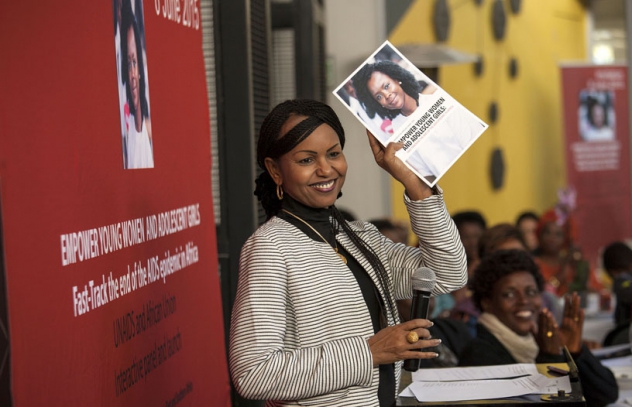The AIDS targets of MDG 6—halting and reversing the spread of HIV—have been achieved and exceeded, according to a new report released today by the Joint United Nations Programme on HIV/AIDS (UNAIDS).
Read more here.
The AIDS targets of MDG 6—halting and reversing the spread of HIV—have been achieved and exceeded, according to a new report released today by the Joint United Nations Programme on HIV/AIDS (UNAIDS).
Read more here.
Remember the old saying, "If you fail to plan, you're planning to fail"? Well, women advocates living with HIV are trying to help the US out of exactly this predicament.
Read more here.
South Africa has undertaken the largest ever national stigma survey involving 10,500 people living with HIV. The Stigma Index Survey revealed that although South Africa has much lower levels of HIV stigma than other African countries, women continue to be disproportionately affected, particularly in relation to sexual and reproductive health.
Read more…

Considerable advances have been made in the global response to the AIDS epidemic over the last decades. Despite this progress, however, young women and…
In this blog post, Violet Shivutse, a 47-year-old farmer and founder of Kenya's branch of the Home-Based Care Alliance, describes how she applied the lessons of farming to grow an entire network of effective, organized caregivers. Read the full article …
Perceiving men and women as equals may encourage the practice of safer sex among young women with HIV, a new study finds. Read the full article here.
Male HIV patients in rural South Africa reach the low immunity levels required to become eligible for antiretroviral treatment in less than half the time it takes for immunity levels to drop to similar levels in women, according to new research from the University of Southampton. Read full article here
Islamabad: A network for women with HIV has been established with an aim to register women from across the country so their rights may be ensured. Positive Female Network (POFEN) has been established by the Association of People Living with HIV (APLHIV) Pakistan, according to a statement issued by the Ministry of National Health Services (NHS) on Monday. Read full article here.
Efforts in combating HIV/AIDS in Malaysia have shown promising success whereby the rate of HIV transmission in the general population is at 0.05%, with the number of AIDS-related deaths steadily on the decline. Read full article here.
In 2012, the Food and Drug Administration (FDA) approved the use of the antiretroviral medication Truvada as the first form of PrEP (pre-exposure prophylaxis), a pill to protect against getting HIV. To date, the United States is the only country to give regulatory approval to PrEP for HIV prevention. Read full article here.
Women’s Day is globally acknowledged and celebrated as a day where women reflect on progress made in all spheres of their lives. On this Day, they call for change, celebrate acts of courage and determination by ordinary women. Women’s Day creates space to honour women who have played an extraordinary role in the history of their communities and countries. It is also a day meant to raise awareness about how women and girls can protect…
Message from UNAIDS Executive Director Michel Sidibé on International Women’s Day - As we celebrate International Women’s Day, world leaders and civil society are gathering in New York to take part in the 59th session of the Commission on the Status of Women. There, they will review the progress made since the adoption 20 years ago of the Beijing Declaration and Platform for Action, which set ambitious targets designed to improve the…
In Epworth, near the Zimbabwean capital, Harare, Médecins Sans Frontières (MSF) has set up HIV support groups where adolescents can meet others living a similar reality. Through sharing their stories, and connecting with one another, their newfound solidarity gradually helps them to become more self-confident. Read full article here.
A vaginal gel thought to reduce women’s chances of contracting HIV during sex has proven to be ineffective, according to a large-scale study conducted by the Follow-on African Consortium for Tenofovir Studies (Facts), a South African research consortium. Read full article here.
On World AIDS Day, Executive Director Phumzile Mlambo-Ngcuka reaffirms UN Women's commitment to fast tracking gender equality, and calls for increased support and investment for women’s empowerment in the context of ending the AIDS epidemic. Read full message here
Ending the AIDS epidemic by 2030 requires a comprehensive approach that includes social justice, the democratization of science, gender equity, and a people-centred approach to health, said United Nations Secretary-General Ban Ki-moon on World AIDS Day, as he spotlighted the gap in prevention and treatment that persist among regions and people. Read message here…
On this World AIDS Day, UNAIDS Executive Director, Michel Sidibé calls for 90-90-90 to be achieved in the next five years: 90% of people living with HIV knowing their HIV status; 90% of people who know their HIV-positive status on treatment; 90% of people on treatment with suppressed viral loads. Read message…
A clinical trial known as Evidence for Contraceptive Options and HIV Outcomes (ECHO)—originally designed to answer important questions about possible connections between risk of HIV infection and the use of non-barrier hormonal contraceptives—now hangs in the balance because of a funding shortfall. Lillian Mworeko and others issue a clarion call for funding in light of the needs of women in the context of HIV. Read full article…
Dr. Mark Dybul, Executive Director of the Global Fund to Fight AIDS, Tuberculosis and Malaria, discusses recent data on how socio-economic factors and levels of risk for HIV are intrinsically connected, especially for young women. Read full article here